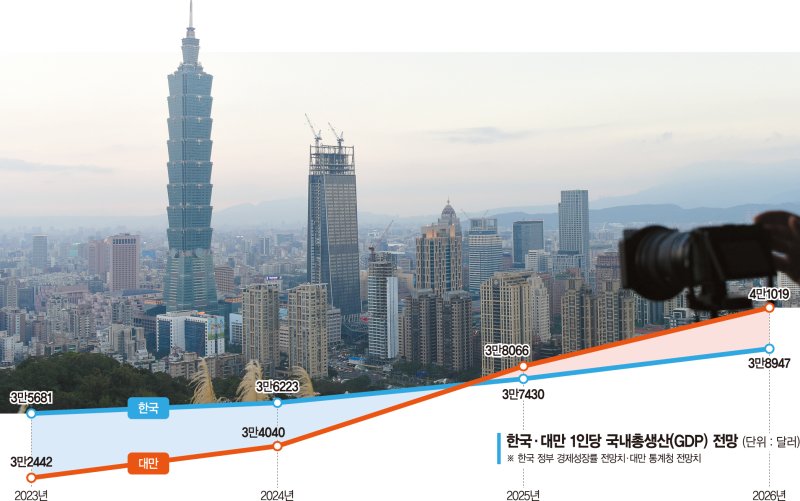[Editorial Analysis] The Three Pro-Business Policies of the Progressive Government: Transforming the Fundamentals of Taiwan’s ‘Economically Weak’ Structure
- Input
- 2025-11-12 18:40:07
- Updated
- 2025-11-12 18:40:07


What are the strengths of Taiwan’s economy, which appears similar yet different from South Korea’s? Notably, unlike South Korea, Taiwan’s progressive government has implemented strong pro-business growth policies, resulting in higher economic growth rates than conservative administrations. With assistance from the Korea Institute for International Economic Policy (KIEP), we examine three key factors behind Taiwan’s remarkable economic development.
1. Pragmatic Economic Reforms by the Progressive Government
Taiwan’s rapid progress has been led by the Democratic Progressive Party (DPP) government. Just over a decade ago, Taiwan’s economy was in dire straits due to sluggish exports, reduced investment, and stagnant domestic demand. After coming to power in 2016, President Tsai Ing-wen of the DPP pushed forward bold economic reforms, which have been carried on by Lai Ching-te, the current president from the same party, who was elected last year. It took less than ten years for Taiwan’s economy to be revitalized through innovation focused on advanced industries, especially semiconductors.
Former President Tsai Ing-wen led economic revitalization and structural reforms under the banner of ‘Smart Taiwan.’ Spearheaded by Taiwan Semiconductor Manufacturing Company Limited (TSMC), the country transformed its industrial structure toward high-tech sectors. For example, a 2-nanometer semiconductor plant, the size of 46 soccer fields, was built in the Kaohsiung Science Park in southern Taiwan and has begun trial production. The Kaohsiung Science Park was initially launched by the conservative Kuomintang (KMT) in the 1990s and later accelerated by the DPP. The Taiwanese government has also strategically fostered five new industries—semiconductors, green energy, defense, advanced biotechnology, and smart precision machinery—by establishing dedicated R&D complexes.
2. Comprehensive Corporate Support and Opposition Cooperation
The DPP has vigorously pursued ‘three pro-business policies’—pro-business, pro-growth, and pro-market. This approach is in stark contrast to South Korea’s progressive governments. Taiwan’s rapid economic growth in a short period can be attributed to these policies. The government passed the Industrial Innovation Act Amendment, which provides an extraordinary 25% tax credit for R&D expenses in advanced sectors such as semiconductors. In addition, labor laws were revised to allow for up to 12 hours of work per day and up to 12 consecutive working days, taking into account the unique characteristics of high-tech industries.
When companies face difficulties, Taiwan’s progressive government is quick to intervene. For example, in times of drought and industrial water shortages, they have redirected agricultural water supplies for industrial use. Although the ruling and opposition parties in Taiwan often clash fiercely in the legislature, as in South Korea, they cooperate when it comes to economic matters. Since the progressive government leads the way on flexible labor and pro-business policies—typically advocated by the conservative opposition—the opposition has little reason to object.
3. Relatively Moderate Labor Unions and Low Wages
Taiwan, of course, has labor unions. However, compared to their South Korean counterparts, union activities in Taiwan are relatively moderate. Martial law, which lasted until the 1980s, suppressed labor movements in Taiwan, much as it did in South Korea. Like Korea, labor union activity in Taiwan became more active from the late 1980s. However, large-scale struggles led by nationwide organizations like the Korean Confederation of Trade Unions (KCTU), targeting the government and corporations, are rare. Although there was strong resistance from labor unions when labor laws were revised, the DPP government did not back down. Unlike in Korea, labor unions in Taiwan tend to focus less on political agendas and more on protecting workers’ rights. Since both the ruling and opposition parties pursue neoliberal and pro-business policies, labor unions have a limited role.
Average wages in Taiwan are lower than in South Korea. The globally high wages of South Korea’s large corporations are largely due to the militant actions of strong labor unions. While high wages benefit households and workers, they reduce corporate profits and hinder investment. This year, Taiwan’s minimum monthly wage is about 1.26 million won, significantly less than Korea’s. Last year, one in five Taiwanese university graduates started at the minimum wage. This year, the average starting salary for university graduates is about 1.49 million won, or roughly 17.8 million won annually—about half of the 36.75 million won average starting salary for regular university graduates in Korea. As a result, young people in Taiwan, who receive relatively low wages, are not particularly enthusiastic about surpassing Korea in per capita GDP.